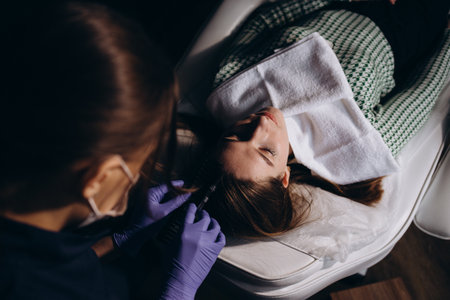Understanding IPL Treatments and Their Popularity in the UK
Intense Pulsed Light (IPL) treatments have become a sought-after solution for a range of skin concerns across the UK. Unlike traditional laser therapies, IPL uses a broad spectrum of light to target various skin issues, such as unwanted hair, pigmentation, sun damage, and visible blood vessels. This non-invasive technology is valued for its versatility and minimal downtime, making it an attractive choice for people leading busy lifestyles. In recent years, IPL has gained significant traction among British clients who prioritise both effectiveness and convenience in aesthetic treatments. The growing popularity can be attributed to increased awareness of non-surgical cosmetic options and the rising demand for advanced skincare solutions that deliver noticeable results. With more clinics offering IPL services across the country, understanding what makes this treatment unique—and why it resonates with so many in the UK—is a crucial first step before choosing a trusted provider.
Regulations and Industry Standards in the UK
When considering IPL (Intense Pulsed Light) treatments, ensuring your chosen clinic adheres to the UKs strict regulatory framework is essential. The UK has established a robust system of regulations, certifications, and industry standards designed to protect clients and maintain high levels of safety and professionalism within the aesthetics sector.
Key Regulatory Bodies and Legal Requirements
The Care Quality Commission (CQC) is the principal regulatory body overseeing clinics that provide certain types of cosmetic treatments in England. Although not all IPL treatments fall under mandatory CQC registration, especially if they are considered non-surgical cosmetic procedures, reputable clinics often voluntarily register to demonstrate their commitment to patient safety. In Scotland, Healthcare Improvement Scotland (HIS) regulates independent clinics providing cosmetic treatments, including IPL. Wales and Northern Ireland have their own healthcare inspectorates with similar mandates.
Core Certifications and Professional Memberships
Clinics offering IPL treatments should ensure their practitioners hold relevant qualifications. Look for certifications such as:
| Certification/Accreditation | Description |
|---|---|
| Level 4 Certificate in Laser and IPL Treatments | This qualification demonstrates advanced understanding of laser and light-based therapies and is often required by insurers. |
| CPD Accreditation | Continual Professional Development (CPD) ensures practitioners stay updated on latest techniques and safety protocols. |
| British Association of Beauty Therapy & Cosmetology (BABTAC) | Membership indicates adherence to high professional standards and ongoing training commitments. |
| Save Face Accreditation | An independent register recognised by the Department of Health, verifying qualifications, insurance, and premises safety for aesthetic practitioners. |
Health & Safety Standards
In addition to qualifications, clinics must comply with UK Health and Safety Executive (HSE) guidelines regarding equipment maintenance, infection control, and risk assessments. It is advisable to ask your chosen clinic about their compliance with these standards and request evidence if necessary.
Data Protection & Client Confidentiality
UK clinics are also subject to GDPR regulations, ensuring your personal data is handled confidentially and securely. A trusted clinic will provide clear information about how your details are stored and used.
The Importance of Transparency
A trustworthy clinic will be transparent about its regulatory status, staff qualifications, insurance coverage, and health & safety practices. Always request this information before booking an appointment; genuine clinics will be happy to provide documentation or direct you to relevant accreditation registers for verification.
![]()
3. Credentials and Qualifications to Look For
When considering IPL (Intense Pulsed Light) treatments in the UK, it is essential to scrutinise the credentials and qualifications of both practitioners and clinics. This not only ensures your safety but also guarantees the efficacy of the procedure. Start by checking that practitioners hold recognised qualifications in aesthetic or medical skin treatments, such as NVQ Level 4 or higher in laser and light therapies. Additionally, they should have received accredited training specific to IPL devices, as these require specialised knowledge for safe operation.
It is also advisable to verify whether the clinic and its staff are registered with relevant professional bodies. In the UK, reputable clinics often maintain memberships with organisations such as the British Association of Beauty Therapy & Cosmetology (BABTAC), the British Medical Laser Association (BMLA), or are on registers like Save Face, which independently assess standards in non-surgical cosmetic treatments.
Further, practitioners should be able to demonstrate up-to-date training certificates and ongoing professional development. With technology and regulations continually evolving, commitment to continual education signals a dedication to best practices. Finally, look for clinics that carry comprehensive insurance coverage, including public liability and treatment risk insurance, which further safeguards your interests as a client.
Assessing Clinic Reputation and Reviews
When considering IPL treatments, assessing the reputation of a clinic is paramount to ensure both safety and effective results. In the UK, where regulations and standards can vary, making informed decisions based on reliable sources of feedback becomes even more crucial. Below, we explore the key strategies for evaluating a clinic’s trustworthiness through online reviews, patient testimonials, and local recommendations.
The Importance of Online Reviews
Online review platforms such as Trustpilot, Google Reviews, and Doctify have become essential tools for prospective patients. These platforms provide real-life insights into customer experiences, allowing you to gauge overall satisfaction levels, staff professionalism, and treatment outcomes. Pay close attention to recurring themes in reviews—both positive and negative—as they can highlight consistent strengths or areas of concern within a clinic.
Patient Testimonials: Real Stories Matter
Authentic patient testimonials offer a deeper understanding of what you can expect from a clinic. Reputable clinics often feature these on their official websites or social media channels. Look for testimonials that discuss specific aspects of care, such as consultation thoroughness, aftercare support, and results achieved. Be wary of overly generic or excessively glowing testimonials, which may not accurately reflect genuine patient experiences.
Recommendations from Local Networks
In the UK, personal recommendations carry significant weight. Seek advice from friends, family members, or colleagues who have undergone IPL treatments locally. Engaging with community groups—such as neighbourhood forums or local Facebook groups—can also yield honest feedback about clinics in your area. This grassroots information is particularly valuable for identifying clinics with established reputations within your community.
Comparison Table: Sources for Clinic Feedback
| Source | Pros | Cons |
|---|---|---|
| Online Reviews | Wide reach; up-to-date feedback; covers multiple clinics | Potential bias; fake reviews possible |
| Patient Testimonials | Detailed insights; first-hand experiences; often clinic-vetted | May be selectively published; less critical content |
| Local Recommendations | Trusted source; tailored to local context; candid opinions | Limited sample size; subjective experiences |
Best Practices When Assessing Reputation
For an accurate assessment, cross-reference information from multiple sources and consider the overall volume and consistency of positive feedback. Clinics with transparent communication and a solid track record across all channels are more likely to deliver safe and effective IPL treatments tailored to British standards and expectations.
Consultation Process and Personalised Care
When selecting a clinic for IPL treatments in the UK, the quality of the consultation process is a key indicator of professionalism and trustworthiness. A reputable clinic will always begin with an initial consultation—this stage is not merely a formality but rather a critical opportunity for both practitioner and patient to discuss skin type, medical history, concerns, and desired outcomes. In the UK, clinics that dedicate time to thorough consultations demonstrate a commitment to patient safety, transparency, and satisfaction.
During your first visit, expect a detailed assessment where the clinician listens attentively to your goals and addresses any questions or apprehensions you may have. This approach allows the practitioner to identify potential contraindications or risks unique to your situation. Genuine clinics will never rush this process; instead, they use it to tailor their recommendations and ensure you understand every aspect of the treatment journey.
Personalisation is another hallmark of trusted UK clinics. Rather than relying on generic protocols, leading practitioners develop bespoke treatment plans crafted specifically for each individual. This customisation takes into account your skin tone, hair colour, sensitivity levels, and lifestyle factors to optimise results while minimising side effects. You should receive clear information about how many sessions are recommended, what kind of results you can realistically expect, and any necessary aftercare tailored to your needs.
Furthermore, a trustworthy clinic will set realistic expectations from the outset. They communicate openly about possible outcomes, timelines for visible improvement, and any limitations of IPL technology in relation to your specific concerns. If a clinic promises instant or ‘miracle’ results without proper assessment or explanation, this is usually a red flag.
Ultimately, the consultation process serves as the foundation for building trust between you and your practitioner. Look for clinics that prioritise patient education, offer evidence-based advice, and create an environment where you feel valued and heard. By investing in thorough consultations and personalised care plans, respected UK clinics ensure not only optimal IPL results but also long-term client satisfaction and confidence.
6. Safety, Aftercare, and Transparency
When selecting a clinic for IPL treatments in the UK, prioritising safety, aftercare, and transparency is non-negotiable. A reputable clinic should adhere to rigorous safety protocols as standard practice. This includes conducting thorough skin assessments before treatment, using CE-marked equipment, and ensuring all practitioners are fully qualified and insured. Clinics should also maintain strict hygiene standards and provide a comfortable, reassuring environment for clients.
Clear communication about potential risks and realistic outcomes is essential. Trustworthy clinics will offer detailed consultations to explain how IPL works, discuss suitability based on your skin type and medical history, and outline possible side effects such as redness or temporary pigmentation changes. You should never feel pressured to proceed without having all your questions answered or without being given adequate time to consider your options.
Aftercare is another critical element of a quality service. The clinic should supply written post-treatment instructions tailored to your skin’s needs—this might include guidance on sun protection, skincare products to avoid, and signs of adverse reactions to watch out for. Furthermore, reputable providers encourage follow-up appointments or check-ins to monitor your progress and address any concerns promptly.
Transparency extends beyond just the procedure itself; pricing structures should be clear with no hidden costs, and you should be informed about the number of sessions likely required for optimal results. Ultimately, choosing a clinic that prioritises your safety, communicates openly, and provides comprehensive aftercare demonstrates professionalism and builds trust—a must when considering any aesthetic treatment in the UK.
7. Red Flags: Signs of Unreliable Providers
When searching for a reputable clinic for IPL treatments in the UK, its crucial to be aware of warning signs that may indicate an unreliable provider. One of the most apparent red flags is the absence of visible credentials or regulatory compliance. Reliable clinics should clearly display their qualifications, affiliations with professional bodies, and Care Quality Commission (CQC) registration where applicable. If you find it difficult to verify a clinic’s credentials or if the staff are evasive when questioned about their experience and training, this should prompt caution.
Another sign to watch out for is overly aggressive marketing tactics. Be wary of clinics that make unrealistic promises, use pressure sales techniques, or advertise ‘miracle results’ without clinical evidence. Reputable providers in the UK adhere to advertising standards and focus on transparency rather than sensationalism.
Unclear or inconsistent pricing is also a common indicator of unreliability. Trustworthy clinics provide transparent information about costs, including consultation fees, treatment packages, and any potential additional charges. If pricing details are vague or subject to frequent changes without proper explanation, it may suggest a lack of professionalism or intent to mislead clients.
In summary, always look for clear credentials, ethical marketing practices, and straightforward pricing when selecting an IPL clinic in the UK. These factors not only reflect industry best practices but also ensure your safety and satisfaction throughout your treatment journey.

